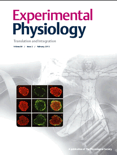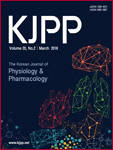
Frontiers in Physiology
metrics 2024
Unleashing innovative insights for health and disease.
Introduction
Frontiers in Physiology, published by FRONTIERS MEDIA SA, is a leading open-access journal that has been at the forefront of physiological research since its inception in 2010. As a reputable publication based in Switzerland, it aims to foster the dissemination of groundbreaking findings across various domains of physiology, engaging a global audience of scholars and practitioners. With a commendable Q2 ranking in the fields of both general physiology and medical physiology for 2023, this journal stands out in its field, achieving a significant Scopus rank of #32/113 in medical physiology and #58/193 in biochemistry, genetics, and molecular biology. Frontiers in Physiology not only commits to maintaining high scholarly standards but also ensures that all its articles are freely accessible, thereby promoting collaborative knowledge exchange. With a clear focus on advancing our understanding of physiological processes, the journal plays a crucial role in the development of innovative approaches to health and disease, making it an essential resource for researchers, professionals, and students alike.
Metrics 2024
 -
- 3.20
3.20 4.00
4.00 -
-Metrics History
Rank 2024
IF (Web Of Science)
JCI (Web Of Science)
Quartile History
Similar Journals

JOURNAL OF PHYSIOLOGY-LONDON
Unveiling the Science of Life and MovementJOURNAL OF PHYSIOLOGY-LONDON, published by WILEY, stands as a prestigious beacon in the fields of Physiology and Sports Science. Established in 1878, this journal has a rich history of disseminating crucial research findings and advancing scientific knowledge, continuing its impact into the present day with an anticipated convergence in 2024. Recognized for its excellence, it ranks in the Q1 category for both Physiology and Sports Science in 2023, cementing its position within the top echelons of academic publications. With a Scopus rank of #26 out of 193 in the Biochemistry, Genetics and Molecular Biology _ Physiology category, the journal boasts an impressive 86th percentile, reflecting its high-quality contributions to the scientific community. Although not open access, its extensive archive and reputation ensure that it remains a vital resource for researchers, professionals, and students eager to stay at the forefront of physiological science. For those looking to deepen their understanding of physiological mechanisms and their applications, the JOURNAL OF PHYSIOLOGY-LONDON is an indispensable resource.

American Journal of Physiology-Regulatory, Integrative and Comparative Physiology
Exploring the Frontiers of Physiological ScienceThe American Journal of Physiology-Regulatory, Integrative and Comparative Physiology, published by the American Physiological Society, serves as a premier platform for disseminating cutting-edge research in the fields of physiology, emphasizing regulatory, integrative, and comparative studies that advance our understanding of bodily functions. With an ISSN of 0363-6119 and E-ISSN of 1522-1490, this esteemed journal is recognized for its substantial impact, maintaining a 2023 Q2 ranking in both the physiology and medical physiology categories as well as commendable positions in Scopus rankings. The journal has been pivotal since its inception in 1977 and continues to foster interdisciplinary dialogue among researchers, professionals, and students alike, contributing significantly to the evolving landscape of physiological sciences. Although it operates under a traditional subscription model, its commitment to high-quality, peer-reviewed content ensures that it remains an essential resource for anyone engaged in physiological research and education.

Journal of Physiological Sciences
Pioneering Research for a Healthier TomorrowThe Journal of Physiological Sciences, published by BMC, stands as a prominent platform for the advancement of research in the field of physiology. Based in Japan, this open-access journal (ISSN: 1880-6546, E-ISSN: 1880-6562) is committed to disseminating high-quality scientific articles that explore various facets of physiological functions and mechanisms. With a 2023 Scopus ranking placing it within the 41st percentile in the category of Physiology, it is recognized for contributing significant insights that bridge basic and applied physiological research. The journal maintains a Q2 quartile ranking within its category, highlighting its impact within the scientific community. Researchers, professionals, and students are encouraged to engage with cutting-edge studies published from 2006 to 2024, fostering an environment of knowledge accessibility and scientific collaboration. The journal not only serves as a vital resource for those involved in physiological research but also promotes broader understanding and application of physiological principles across various health and science sectors.

Current Opinion in Physiology
Connecting Researchers to the Pulse of PhysiologyCurrent Opinion in Physiology, published by Elsevier, is a leading journal dedicated to the dynamic field of physiology. With an E-ISSN of 2468-8673, this journal provides a platform for the latest insights and perspectives, reflecting the evolving landscape of physiological research. Operating from the United Kingdom, the journal holds a respectable impact factor and is ranked Q2 in both general physiology and medical physiology categories, highlighting its prominence among the global academic community. With Scopus rankings placing it in the 64th and 60th percentiles within its respective categories, Current Opinion in Physiology serves as an essential resource for researchers, professionals, and students eager to stay informed about innovative theories and emerging trends in physiology. The publication emphasizes high-quality reviews that summarize current knowledge and future directions, ensuring readers gain valuable insights applicable in both clinical and research settings.

Physiology International
Empowering Knowledge in Physiology and WellnessPhysiology International is a distinguished journal dedicated to the exploration and advancement of knowledge in the fields of physiology, sports medicine, and rehabilitation. Published by AKADEMIAI KIADO ZRT in Hungary, this open-access journal has been a reliable source of scholarly articles since its inception in 2016, providing valuable insights into both complementary and alternative medicine, as well as traditional medical practices. With an impact factor that situates it in Q2 and Q3 quartiles across related disciplines, including Physical Therapy, Sports Therapy and Rehabilitation and Orthopedics and Sports Medicine, it represents a vital resource for professionals and researchers looking to stay abreast of the latest findings and methodologies. The journal is indexed on Scopus, signifying its credibility and relevance in the medical community. As it continues to develop through 2024, Physiology International invites contributions that challenge existing paradigms and foster innovative approaches to health and wellness, making it an essential platform for advancing the conversation in medical physiology and its applications.

JOURNAL OF PHYSIOLOGY AND BIOCHEMISTRY
Illuminating Pathways in Biochemistry and PhysiologyJOURNAL OF PHYSIOLOGY AND BIOCHEMISTRY, published by Springer in the Netherlands, serves as a pivotal platform for disseminating high-quality research within the fields of physiology, biochemistry, and related biomedical sciences. With an impressive impact factor reflected in its categorization as Q2 in Biochemistry and Q1 in Medicine (miscellaneous), this journal fosters a vibrant community of scholars dedicated to advancing knowledge and innovation. The journal’s broad scope encompasses a wide range of topics from cellular mechanisms to systemic physiology, making it relevant for both theoretical and applied sciences. Researchers and practitioners are encouraged to utilize the available Open Access options to reach a wider audience. The journal’s continuous contribution to the scientific dialogue since its inception in 1996 positions it as a key resource for professionals and students alike, facilitating the exploration of cutting-edge topics and collaborative research opportunities.

PFLUGERS ARCHIV-EUROPEAN JOURNAL OF PHYSIOLOGY
Exploring the Depths of Physiological InnovationPflügers Archiv - European Journal of Physiology, published by Springer Heidelberg, stands at the forefront of physiological research, showcasing groundbreaking studies since its inception in the 1950s. With a distinguished ISSN of 0031-6768 and an E-ISSN of 1432-2013, this esteemed journal maintains a robust reputation, holding Q1 rankings in Clinical Biochemistry, Physiology, and Medical Physiology as of 2023. Its impressive Scopus rankings place it in the top percentile across various categories, including Biochemistry, Genetics and Molecular Biology and Medicine. Pflügers Archiv serves as a vital platform for researchers, professionals, and students, facilitating the dissemination and discussion of advanced physiological concepts and methodologies. Although it does not currently offer open access, its rigorous peer-review process ensures the highest quality publications that contribute significantly to our understanding of physiological science. Explore the depth of physiological research that shapes our academic landscape today.

EXPERIMENTAL PHYSIOLOGY
Exploring the intricate dance of nutrition and physiology.EXPERIMENTAL PHYSIOLOGY, published by WILEY, stands as a vital resource in the fields of Nutrition and Dietetics and Physiology, providing high-quality, peer-reviewed research since its inception in 1990. With an impressive categorization into the Q2 quartile in these domains, the journal emphasizes the integration of experimental and clinical findings, making significant contributions to our understanding of physiological processes and nutritional impacts on health. The journal operates within a competitive landscape, ranked significantly in Scopus, showcasing its relevance to both the medical community and nutritional sciences, as evidenced by its rankings in Nursing, Medicine, and Biochemistry. Though it is not currently open access, the journal remains an indispensable tool for researchers, professionals, and students seeking to deepen their knowledge and stay updated on cutting-edge research. With a publication window extending to 2024, EXPERIMENTAL PHYSIOLOGY continues to influence the academic discourse and promote advancements in its respective fields.

KOREAN JOURNAL OF PHYSIOLOGY & PHARMACOLOGY
Advancing knowledge in physiology and pharmacology.Welcome to the Korean Journal of Physiology & Pharmacology, a pivotal academic platform dedicated to advancing the disciplines of physiology and pharmacology. Published by the esteemed Korean Journal of Physiology & Pharmacology, this journal has been disseminating valuable research findings since its inception in 1997 and continues to be a critical resource for researchers, professionals, and students in South Korea and beyond. With an ISSN of 1226-4512 and E-ISSN of 2093-3827, it offers insights into various aspects of drug action and physiological mechanisms. Although this journal currently does not subscribe to Open Access, it plays a vital role in bridging the gap between experimental and clinical studies, receiving commendations for its quality. In the 2023 Scopus rankings, it is notably positioned in the Q3 quartile for Pharmacology and Q4 for Physiology, reflecting its commitment to excellence. As the journal converges towards its comprehensive coverage in 2024, it remains a cornerstone for those looking to engage deeply with critical developments in these fields.

Function
Pioneering discoveries that drive the evolution of healthcare.Function is a pioneering open access academic journal published by Oxford University Press, dedicated to advancing research in the fields of Cancer Research, Cell Biology, Molecular Medicine, and Physiology. Since its inception in 2020, this journal has quickly established itself as a vital resource for researchers and professionals alike, achieving a commendable impact factor in the 2023 rankings, where it stands in the Q2 quartile across multiple categories. Located in the heart of the United Kingdom, Function aims to foster a global exchange of knowledge by providing free and unrestricted access to cutting-edge research, facilitating collaboration and innovation within the scientific community. With a robust focus on emerging discoveries and interdisciplinary approaches, this journal encourages contributions that unravel the complexities of biological functions, paving the way for transformative advancements in healthcare and related sciences. As it converges from 2020 to 2024, Function continues to be an invaluable platform for disseminating research that has the potential to shape the future of medicine and biology.